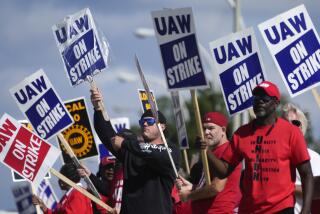Should bailout pay off more?
- Share via
WASHINGTON — As banks begin paying back their federal bailout money, some lawmakers and government watchdogs worry the Obama administration isn’t driving a hard-enough bargain on the one part of the investment that could generate a profit for taxpayers.
Banks that received money from the $700-billion Troubled Asset Relief Program were required to supply the government with warrants to buy future stock at a set price. Congress wanted taxpayers to benefit if the banks became financially healthier.
But on Wednesday, some members of a House subcommittee questioned the head of the TARP program about what they saw as mixed results on some early returns.
Those questions arose even though Goldman Sachs Group Inc., which repaid $10 billion in TARP money last month, said Wednesday that it had repurchased its warrants from the government for $1.1 billion.
Combined with $318 million Goldman Sachs paid in dividends, the government made an annualized profit of 23% on the TARP money it injected into the company last fall.
“That sounds pretty good. But is it enough?” said Rep. Dennis Moore (D-Kan.), chairman of the House Financial Services oversight and investigations subcommittee.
Herbert M. Allison Jr., the assistant Treasury secretary who heads the TARP program, said the Obama administration was “very pleased” with the Goldman Sachs deal and was working to maximize the return in negotiations with other large banks.
“Treasury is committed to getting fair value for the taxpayers for these warrants,” he said. “We know they’re the ones who put their money at risk, and we feel a great obligation.”
The Congressional Oversight Panel reported this month that the Treasury Department had sold the warrants back to some banks below market value.
Eleven smaller banks had repurchased their warrants by July 2 for a total of $18.7 million, but the oversight panel estimated that the warrants were worth about $28.2 million. That return of 66 cents on the dollar would translate to a loss of $2.7 billion for the entire program, the panel said, though it noted that those sales amounted to less than 1% of the warrants held by the government.
Goldman Sachs bought back its warrants for about what the panel estimated they were worth, said Elizabeth Warren, chairwoman of the Congressional Oversight Panel. But she said the panel preferred a more open process, including sales through public auctions in most cases.
Allison said that auctions are an option and that the Treasury Department eventually would provide more information about how it values the warrants.
Warrants are contracts that allow the holder to buy a set number of common shares at a specific price on or before a certain date. When a bank repays its TARP money, it has the right to buy back its warrants at a fair market price.
Figuring out that price is difficult because the warrants don’t trade on any market, Allison said. The administration can hold the warrants for 10 years, but it does not want to be a long-term investor in the banks, he said.
A bank has 15 days after repaying its TARP money to make an offer for buying back its warrants from the Treasury, which uses models and independent experts to determine whether the offer is fair. If the sides can’t agree on a price, the warrants would be auctioned in the open market.
Last month, 10 major banks were allowed to repay their bailout money, which totaled about $68 billion. Now the Treasury is working to sell warrants.
“In most cases, we have not accepted the bank’s bid,” Allison said.
JPMorgan Chase & Co. said this month that it wanted the warrants it issued to be auctioned to the public because the Treasury was seeking too high a price.
Asked about the oversight panel’s report, Allison said some small banks received a discount on their warrants because there wouldn’t be much demand for them on the open market. Goldman did not receive such a discount and neither would other large banks because there is a market for their warrants, he said.
Such small-bank discounts might be appropriate, Warren said, and there could be other factors in the government’s negotiations to buy back the warrants.
“There may be considerations other than maximizing return to the taxpayer -- for example, trying to get out of this business of holding warrants,” Warren said. But she stressed it was important for the government to get a good deal.
“This is the American taxpayers’ one opportunity to participate in the upside” of the bailouts, she said.
Several lawmakers praised the deal on the Goldman Sachs warrants, which reportedly came after the Treasury refused a lower offer.
“I appreciate that Goldman Sachs did the right thing today, and we urge all the others to follow this example,” said Rep. Barney Frank (D-Mass.), chairman of the House Financial Services Committee
Goldman Sachs had long wanted to get out of TARP. It said it did not need the money, which former Treasury Secretary Henry M. Paulson wanted all large banks to take last fall to avoid identifying which were weak. The company also balked at executive compensation restrictions attached to the money and pressed for months to be allowed to repay it. Last week it reported a record quarterly profit of $3.4 billion.
Chief Executive Lloyd C. Blankfein said the 23% return on the government’s investment reflected the company’s thanks.
“We are grateful for the government efforts and are pleased that this additional money can be used by the government to revitalize the economy, a priority in which we all have a common stake,” he said.
--
jim.puzzanghera@ latimes.com
More to Read
Inside the business of entertainment
The Wide Shot brings you news, analysis and insights on everything from streaming wars to production — and what it all means for the future.
You may occasionally receive promotional content from the Los Angeles Times.











